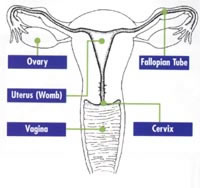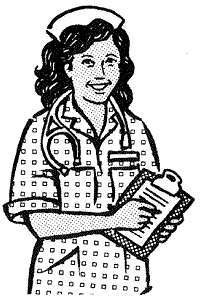1996
A Risk or Cervical Cancer
A number of scientific studies, including research by the National Institute for Occupational Safety and Health (NIOSH), have found a higher than usual risk of cervical cancer among women working in the dry cleaning industry. Cervical cancer is a health problem that only women can get. It affects a part of the body called the cervix, which is the opening to a woman's womb.
Since many factors can cause cervical cancer, the exact reason for the higher rates among dry cleaning workers is not certain. But whatever the reason, women in this industry need to know that they should get checked for this disease.
Fortunately, there are good medical treatments for cervical cancer. If cervical cancer is found in its early stages, the chance of full recovery is very high.
How Do Doctors Check for Cervical Cancer?
The most important test for cervical cancer is called a Pap test (also called a Pap smear). In this test, the doctor takes some cells from the surface of the cervix and sends them to a laboratory where they are checked for signs of cancer. The procedure is quick and most women find it painless. A doctor, nurse, or some other medical provider usually does the test during a routine pelvic examination.
How Often Should I Be Checked?
These guidelines have been developed by the American Cancer Society, the National Cancer Institute, the American College of Obstetricians and Gynecologists, the American Medical Association, and the U.S. Centers for Disease Control and Prevention:
- All women between the ages of 18 and 65 should get a pelvic examination and Pap test once every year, unless their doctor suggests less frequent testing.
- Women who are under the age of 18 and are sexually active should also get a pelvic examination and Pap test once every year.
- Women with a higher risk of cervical cancer may need to be examined more often. This would apply to you if previous Pap tests have shown a possible problem.
After age 65, the risk for cervical cancer decreases and your doctor may recommend that you no longer need to be tested every year. However, if you are over 65 and have never been tested, you should talk to the doctor about getting a Pap test and how often you need to be checked from now on.
PAP Testing After Hysterectomy
In the United States, approximately a third of all women over 50 years of age have had a hysterectomy ~ a surgical operation in which the womb (uterus) is removed for medical reasons. The vast majority of women who have had a hysterectomy do not have a cervix anymore, and are not at risk for developing cervical cancer.
However, a small percentage of women have had a "supracervical hysterectomy." These women have had their womb and/or their ovaries removed, but they still have a cervix. They are still at risk of developing cervical cancer and should get Pap tests yearly, or as recommended by the doctor.
If you have had a hysterectomy and are not sure whether you still have a cervix, talk to your doctor. The doctor can check for the presence of a cervix during a pelvic examination.
Human Papilloma Virus (HPV) Testing
Depending on your personal health history, your doctor may suggest that you also be tested for Human Papilloma Virus (HPV). HPV is a common virus that spreads through sexual contact. The more sex partners a person has, the higher the risk of getting HPV. Many people have HPV without knowing it, because often there are no symptoms. Having HPV does not mean that you have cancer, but it can increase the risk for developing cervical cancer.
HPV testing is not routine, but your doctor can include this test in your physical exam if you need it. Like the Pap test, the HPV test is easy and painless. Talk with your doctor about whether or not you should get tested for HPV in addition to your Pap test. Your doctor will be able to answer any questions you may have.
Covering the Costs of Screening
In New York City, dry cleaning workers are represented by the Amalgamated Service and Allied Industries Joint Board, UNITE! (Union of Needletrades, Industrial and Textile Employees, AFL-CIO, CLC).
For Union members, the Amalgamated Service and Allied Industries Insurance Fund will cover the cost of getting a Pap test once a year, or more frequently if your doctor recommends it. HPV testing is also covered if your doctor recommends it.
As a Union member, you can get these tests done when you visit the doctor using your annual "GOOD HEALTH DAY." A list of union-affiliated medical clinics in the New York metro area is included on this site. The clinics are also listed on the back of your medical card (Multi plan).
If you know someone who does not belong to the union and she has no other form of medical insurance, tell her that non-union insurance programs will usually cover annual Pap testing. She may also be eligible for free or low-cost Pap testing funded under the National Breast and Cervical Cancer Early Detection Program. (Call 888-842-6355.)
Need More Information?
If you have questions about getting tested, here are some places you can contact for advice:
Amalgamated Service & Allied Industries Insurance Fund
275 7th Avenue, 15th floor
New York, NY 10001
(212) 206-8900
www.uniteunion.org
Union Health Center
(212) 924-2510
(English and Spanish)
1115 Medical Center (SEIU)
(212)542-1180 (212) 997-7505
National Breast and Cervical Cancer Early Detection Program
in New York City
(800) 422-6237 or (800) 227-2345
New York City Health Department. Women's Health Line
(212)230-1111
If you want more information about cancer and cancer screening, contact:
National Cancer Institute
1-800-4-CANCER
(that's 1-800-422-6237)
http://www.cancer.gov/
American Cancer Society
1-800-ACS-4235
http://www.cancer.org
U.S. Centers for Disease Control and Prevention National Breast and Cervical Cancer
Early Detection Program
1-888-842-6355
http://www.cdc.gov/cancer/nbccedp/
If you would like more information about health research that has been done by the National Institute for Occupational Safety and Health (NIOSH), contact:
NIOSH toll-free information line
Monday through Friday, 8:00 A.M. to 4:00 P.M.
1-800-356-4674
You can read the study reports by visiting the following NIOSH web site:
http://www.cdc.gov/niosh/
Once at this site, click on "Safety and Health Topics". The study reports can be found under the topic /'Organic Solvents". The NIOSH Internet special web site containing more information about work in the dry cleaning industry is now under construction and should be added to this list in the next few months. At that time, you will be able to get more information about perc and other dry cleaning solvent exposures.
To request copies of the NIOSH study reports on occupational health published by NIOSH, please contact:
NIOSH Publications Office: 513-533-8120
email: pubstaft@cdc.gov
www.cdc.gov/niosh
 Every year almost 7000 women in the United States die of cancer of the cervix. Most of these women could be alive if they had had regular Pap tests. Pap tests help doctors find cervical cancer early when it is almost always 100% curable. Every woman should start having Pap tests when she begins having sex (or reaches the age of 18) and continue having them for the rest of her life.
Every year almost 7000 women in the United States die of cancer of the cervix. Most of these women could be alive if they had had regular Pap tests. Pap tests help doctors find cervical cancer early when it is almost always 100% curable. Every woman should start having Pap tests when she begins having sex (or reaches the age of 18) and continue having them for the rest of her life. The Pap smear can help your doctor find changes in the cells on your cervix that might lead to cancer.
The Pap smear can help your doctor find changes in the cells on your cervix that might lead to cancer. The Pap smear is often part of a yearly check-up. During your visit, the doctor or nurse might also be checking for other things like breast cancer, diabetes, or heart disease. During your Pap smear your doctor or nurse will insert a tool called a speculum, into your vagina to open it and make it easier for them to see your cervix.
The Pap smear is often part of a yearly check-up. During your visit, the doctor or nurse might also be checking for other things like breast cancer, diabetes, or heart disease. During your Pap smear your doctor or nurse will insert a tool called a speculum, into your vagina to open it and make it easier for them to see your cervix. A brush and a wooden spatula (like a popsicle stick) are used to collect a sample of cells from the cervix.
A brush and a wooden spatula (like a popsicle stick) are used to collect a sample of cells from the cervix. American Social Health Association
American Social Health Association Having a Pelvic Exam and Pap Test
Having a Pelvic Exam and Pap Test This Exam:
This Exam:
 The exam is over and you can get dressed.
The exam is over and you can get dressed.